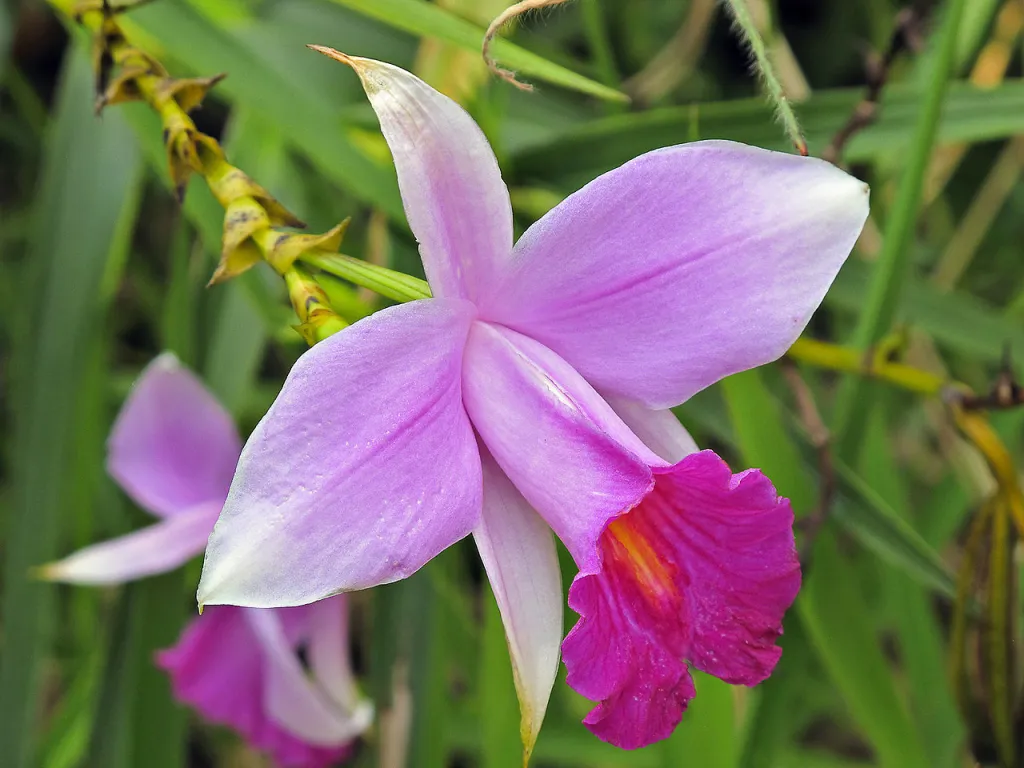Zhang Jiuling 感 遇 其
Each flower blossoms in its season, each flower has its place. And so the hermit in the forest seeks nothing more than to be allured by sweet winds and contented with natural beauty.
ORCHID AND ORANGE I, by Zhang JIuling
A tender orchid-leaf in spring,
And a cinnamon-blossom bright in autumn
Are each as self-contained as life itself,
Which conforms them to a season.
Then why should you think that a forest-hermit,
Allured by sweet winds and contented with beauty,
Would no more ask to be transplanted
Than any other natural flower?
兰叶春葳蕤,
桂华秋皎洁
欣欣此生意,
自尔为佳节
谁知林栖者,
闻风坐相悦
草木有本心,
何求美人折
Lán yèchūnwēi ruí,
guì huá qiū jiǎojié
xīnxīn cǐ shēngyì,
zì ěr wèi jiājié
shéi zhī lín qī zhě,
wén fēng zuò xiāng yuè
cǎomù yǒu běn xīn,
hé qiú měirén zhé
Thoughts on Orchid and Orange, I
One must begin with the caveat that all translations are inherently suspect, including this one.
I begin with the poem’s title, Orchid and Orange.
Zhang Jiuling’s actual title is 感 遇 其, which translates something like, “the sense (feeling) of it.” Orchid and Orange come from the first two lines of the poem and the beauty in assonance. 蘭 (Lán), the orchid, or precisely Cymbidium, a particular variety of orchid that is much prized and cultivated. 桂 (Gui), the Osmanthus, a bush or small tree, none variety of which has orange blossoms, but others are bright white.
Zhang Jiuling
Zhang Jiuling (678–740) was mentioned in several poems by Meng Haoran. He was a member of the Chinese literati class, with its hierarchy and system of advancements, primarily by examination, but also by means of court favor. For purposes of the poem the literati should be compared with the ascetic Confucian hermits who were by definition loners living in the mountains and forests.
Zhang Jiuling was for a period commandant of the city of Guilin, famous for its fragrant flowering Osmanthus and as a destination for Buddhist monks in pursuit of enlightenment.
The phonetic similarity of Guilin and Jiuling is a fitting.
Losing Favor
Zhang was a chancellor and an out-spoken advisor to Emperor Xuanzong.
A question arose as to the fate of General An Lushan. Zhang favored execution. The emperor disagreed and eventually demoted Zhang from his post.Zhang retired from public life and died in 740.
After his death, General An Lushan rebelled, the emperor fled the capital to the mountains of Sichuan ,and passed the throne to his son. The new emperor, remembering Zhang’s warning, honored him posthumously.
Osmanthus 桂 and Cymbidium 蘭
蘭 (Lán) is the Cymbidium, a large orchid that blossoms in spring in an array of colors, a symbol of the horticulturalist’s virtuosity and a dream to propagate.
蘭 葉 春 葳 蕤
Cymbidium verdant in spring is luxuriant with blooms
桂 (Gui) is the Osmanthus that blooms in August. It is a small tree or bush, cultivated in pots, a symbol of love and romance. Osmanthus is also known as sweet osmanthus, sweet olive, tea olive. Its tiny bright flowers range in color from white to orange. Gui has a double meaning, referring also to expensive or valued, and to a clan of former rulers. There is a well-known city called Guilin which means “fragrant forest”, referring to its many fragrant Osmanthus trees. Guilin was a destination for Buddhist monks.
桂 華 秋 皎 潔
Osmanthus flower in autumn blooms bright
So what do I come up with?
A cymbidium, so luxuriant in spring as the
Sweet olive which blossoms bright in autumn
Each as self-contained as life,
Which keeps to its season.
So why do you think that a forest-hermit,
Seduced by sweet winds and surrounded with beauty,
Would wish to be displaced
More so than any other forest-flower?
Can one truly get a sense of the feeling of nature? Would one who enjoys the forest and nature want to be transplanted to the city?
Will I come back to this? Or will I enjoy the beauty of the blossom and leave it at that? Some thoughts are ineffable.
Could it be the thought is nothing more than this:
Would you think that a forest-hermit, well-content with the beauty of his home, would favor less a natural setting than a forest-orchid?
And for fun let’s say it in French:
Pense-tu qu’un ermite de forêt, bien content de la beauté de sa gîte, favoriserait moins un cadre naturel qu’une orchidée de forêt?












